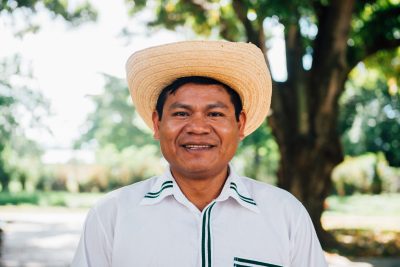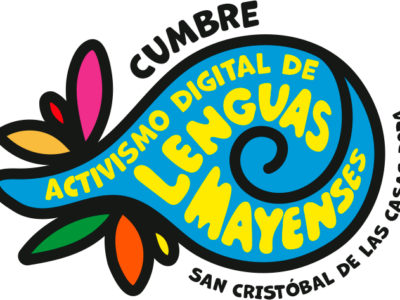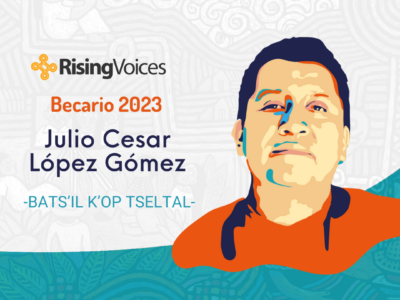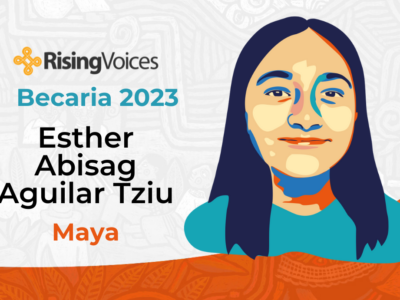
Photograph shared by José Chuvé Mengarí.
In 2020, we continue our social media campaign by inviting different hosts to manage the @ActLenguas (Language Activism) Twitter account and share their experiences with the revitalization of and advocacy for native languages. This profile post is about José Chuvé Mengarí or José “Tigre” (@JoseChuvem) and what he plans to discuss during his week as a host.
Rising Voices (RV): Please tell us about yourself.
Indígena de la nación Monkox-chiquitana. Nací y viví en la Tierra Comunitaria de Orígen Lomerío, hasta mis 22 años, cuando decidí migrar a la ciudad de Santa Cruz de la Sierra, donde resido actualmente, para estudiar Sociología en la Universidad Autónoma Gabriel René Moreno. Soy técnico indígena en el Gobierno Autónomo Municipal de Santa Cruz de la Sierra, community manager de varias páginas con temática indígena urbana y, coordinador y productor en el programa radial Voces Indígenas Urbanas (VIU). También soy actor protagónico en la película “Santa Clara“. Trabajó en varias producciones publicitarias para diferentes empresas del país.
I belong to the Monkox-Chiquitano indigenous nation. I was born and I lived in the Native Community Lands (TCO, for its initials in Spanish) of Lomerío until I was 22 years old, when I decided to migrate to the city of Santa Cruz de la Sierra, where I currently reside, to study Sociology at the Gabriel René Moreno Autonomous University. I am an indigenous specialist in the Municipal Autonomous Government of Santa Cruz de la Sierra, Bolivia. I am also community manager of several webpages with urban indigenous themes, and coordinator and producer of the ‘Urban Indigenous Voices’ (Voces Indígenas Urbanas, VIU) radio program. I am also a leading actor in the movie “Santa Clara“. I worked in various advertising productions for different companies in the country.
RV: What is the current status of your language on the internet and offline?
El idioma bésiro está muy poco difundido en la Internet. Las iniciativas que otras personas realizaron, por ahora están paralizadas. En la TCO Lomerío, se están desarrollando los NIDOS LINGUISTICOS, esfuerzos realizados entre la CICOL-IPELC y la ONG CEJIS. En esta zona, todavía se mantiene en un 40% el idioma, pero hablado por los adultos mayores.
The Bésiro (or Chiquitano) language is not widely disseminated online. The other language initiatives carried out are currently inactive. In the Native Community Lands of Lomerío, the Nidos Linguisticos (Language Nests) are being developed, through efforts made by the Central Indígena de Comunidades Originarias de Lomerío (CICOL,Union of Indigenous Communities of Lomerío) —Instituto Plurinacional de Estudio de Lenguas y Culturas (IPELC, Plurinational Institute for the Study of Languages and Cultures) and by the CEJIS NGO. In this area, about 40 per cent of the population use the language, but it is spoken only by older adults.
RV: On what topics do you plan to focus during the week that you’ll manage the @ActLenguas Twitter account?
Producción audiovisual, que es en lo que actualmente estamos trabajando desde VIU, considerando que es el público joven que está metido en las redes sociales. Y, desde luego, enfocando desde los derechos a la ciudad para los indígenas.
I will focus on audiovisual production, which is what we are currently working on at VIU, considering that it is the young audience that is involved in social networks. And, of course, I will highlight also the indigenous rights in the city.
RV: What are the main motivations for your digital activism for your language? What are your hopes and dreams for your language?
Reaprender la lengua materna de mis padres y, de esa manera, fortalecer mi identidad cultural en la ciudad. Hay muchos saberes y conocimientos ocultos en nuestra lengua, que tienen que darse a conocer a los no indígenas, para fortalecer lazos de convivencia pacífica en la ciudad. Sueño con subir contenidos audiovisuales a diferentes plataformas pero, lo más cercano, subir a Spotify música Monkox, para que esté al alcance de los jóvenes.
I aim to relearn my mother tongue and, in this way, to strengthen my cultural identity in the city. There is a lot of wisdom and knowledge hidden in our language, which must be made known to non-indigenous people, in order to strengthen ties of peaceful coexistence in the city. I dream of uploading audiovisual content to different platforms but, as possible, upload Monkox music to Spotify, so that it is available to young people.



